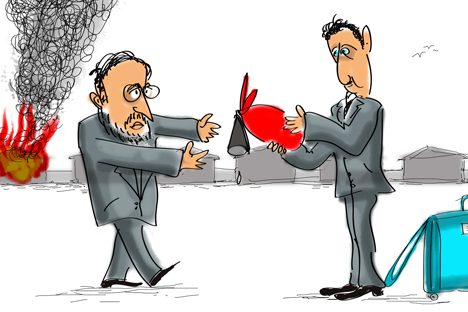
Click to enlarge the image. Drawing by Niyaz Karim
The first stage in the destruction of Syrian chemical weapons arsenals started on Sunday, Oct. 6. The Syrian military brought all the chemical weapons they had at their disposal to four cities — Damascus, Homs, Latakia and the part of Aleppo under their control — in order to accelerate the liquidation process.
The work to dismantle bombs and warheads designed for delivering toxic substances to a target is being carried out directly by the Syrian military. According to the press service of the United Nations, the inspectors are only monitoring the process.
Judging by a letter from U.N. Secretary General Ban Ki-moon to U.N. Security Council members, the second phase — destruction of the toxic materials themselves and the equipment necessary for their manufacture — will follow. Mobile dismantling stations will apparently be used, though nothing about this process is fully clear yet.
The final phase of the operation is ensuring that the entire chemical weapons arsenal in Syria has been destroyed. The U.N. Secretary General emphasized that “the last phase will be the most difficult,” since experts must often work in areas affected by conflict. This applies to areas around Damascus, Homs and Aleppo.
Russia, as Foreign Affairs Minister Sergei Lavrov underscored, considers the confiscation and destruction of anti-government forces’ chemical weapons stocks to be necessary as well. Moscow is convinced that all of the incidents related to the use of chemical weapons in Syria have occurred at the hands of the opposition.
For now, however, both Russia and the United States are praising Damascus. “I am glad that the Assad regime is fulfilling the conditions of the Security Council resolution,” said U.S. Secretary of State John Kerry, after talks with Lavrov on Oct. 7 at the APEC summit in Bali.
Russian President Vladimir Putin was also pleased. “We have agreed with our American partners on what we must do in the medium-term future [regarding resolution of the situation in Syria] and on how to do it. Doubts as to whether the Syrian leadership would react adequately to the resolutions on chemical weapons were unfounded. The leadership of Syria is very actively involved in this work and operates very transparently. I hope that this work will continue at the same pace and in the same vein,” he stated at a press conference following the APEC summit.
Lavrov: U.S. could be more effective in drawing Syrian opposition to Geneva II
However, even though it creates an important precedent in world politics, rapid progress toward resolving the Syrian chemical weapons problem does not, in itself, solve the problem of restoring peace in this country.
In Bali, the diplomatic heads of the U.S. and Russia agreed that a peace conference on Syria (Geneva-2) will be held in November. “Most likely, we are talking about the second week of November,” Kerry said after the talks. Only there will it be possible to come to an agreement concerning the transfer of the conflict to a political course.
Geneva-2 was first brought up after Kerry’s May visit to Moscow. However, the conference dates were mentioned with great hesitation. The problem was that one of the sides — the Syrian opposition — was not ready for talks.
This was not because the opposition cannot bear official Damascus and its main demand is the resignation of Bashar Assad, but because the opposition did not — and still does not — exist as a unified political or military force.
“We support efforts toward the formation of a delegation from the opposition that would be representative,” said Lavrov at a press conference in Bali. At the same time, he called attention to the fact that, when a representative of the Syrian National Coalition had announced the opposition’s readiness to participate in Geneva-2, a different representative declared the opposite on the very next day.
Against this backdrop, Assad is once again (as in the case of the chemical weapons) demonstrating flexibility. “Syria is prepared for participation in the Geneva Conference at any time. Our only condition is that we will not engage in dialogue with terrorists or those who call for foreign intervention. The solution must be Syrian and the dialogue political,” said the Syrian leader, speaking on the occasion of the 40th anniversary of the Arab-Israeli War.
On the other hand, Assad is very elusive regarding the prospects for his presidency. In an interview with the German magazine “Spiegel,” he emphasized that nothing was certain. “In August of next year, the term of my office will expire. We will carry out presidential elections two months before that. I cannot say yet whether I will take part in them. That depends on the mood of the population. If I no longer feel the will of the people, then I will not participate,” said Assad.
With this statement, the Syrian president resolves the issue of his resignation from the Geneva-2 agenda and tosses the ball into the court of the opposition.
The initiators of the conference — Russia and the U.S. — are trying to shift some of the responsibility for its implementation onto the United Nates. As Kerry stated in Bali, the U.N. will determine the exact date of the proceedings of the conference on resolution of the Syrian problem, in partnership with the special representative of the United Nations and Arab League on Syria, Lakhdar Brahimi.
All rights reserved by Rossiyskaya Gazeta.
Subscribe
to our newsletter!
Get the week's best stories straight to your inbox